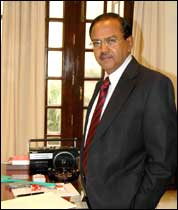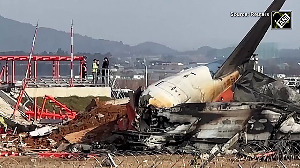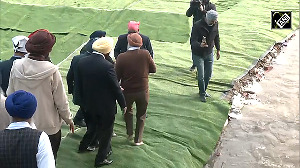Last week, Ajit Doval, former chief of Intelligence Bureau, spoke about the threat of Bangladeshi infiltration to India's internal security.
Part I: 'Bangladeshi infiltration is the biggest threat'
Today he tells Managing Editor Sheela Bhatt about the Maoist threat to India's hinterland.
Besides Bangladeshi infiltration and border management, which are the other prime concerns to the managers of national security?
The Naxal menace, also called the Left extremist movement, is another extremely important issue bothering India. It is another dangerous area for internal security.
 When you talk of securing India we ask ourselves what you are trying to secure. When we try to put up a fence on the border we are securing our territorial integrity, our sovereignty. We are trying to secure ourselves from Inter Services Intelligence activities. But when we tackle the Maoists, we are trying to secure our rule of law and our Constitution.
When you talk of securing India we ask ourselves what you are trying to secure. When we try to put up a fence on the border we are securing our territorial integrity, our sovereignty. We are trying to secure ourselves from Inter Services Intelligence activities. But when we tackle the Maoists, we are trying to secure our rule of law and our Constitution.
When we talk of taking on the Maoists, we talk about securing our system of governance. The Maoists threaten our Constitution, rule of law and our type of governance. Through use of violence, and not through the ballot boxes, they want to change the rules and governments.
How to wean youth away from the Maoists
There are grave implications of this thinking to India's national security.
First, the sheer geographical expanse of the Maoist influence affects 40 percent of India. In terms of actual operational area it's four times more than Punjab militancy, Kashmir terrorism and North-east insurgencies combined. Second, the response to this problem will be difficult.
When in the presence of 10,000 people jan adalats are formed and punishment by death is handed out and the Indian police doesn't file even an FIR, what do you expect? The official response to Maoists is the trickiest part of the issue. When the Punjab problem started, the Indian government could not cover the countryside of Punjab even with heavy deployment of paramilitary forces. In J&K only a small strip of the Valley is affected but we need 5 to 6 Army Corps and paramilitary forces. And still it's difficult to police and dominate the interiors of Kashmir.
The Maoist struggle is in the huge hinterland of India. If at any place, 10,000 people jointly attack and if 30 percent of them are armed, security men can't retaliate because the resultant killings will do more damage than good. Do you know why in the Jehanabad jail-break more than 1,000 people joined hands? They need only 25 to 30 trained and skilled people to break the cordons and attack the jail. But as Charu Majumdar said, every revolutionary must soak his hands in blood.
As happens in underworld gangs, when a newcomer comes they ask him to commit a murder so that he becomes an accused and then he will not have any option but to join the gang permanently. All those who joined hands in raiding the Jehanabad jail will remain with Naxalite movement all their life because all of them are co-accused in a serious crime.
There have been more than 500 such incidents committed by Maoists in the last two years. Imagine what a force they have at their disposal! The Maoist leaders know that eventually if they have to fight the Indian military they can't win against the 'occupying State', all those 'liberated areas' cannot remain liberated if you don't have the 'shield' of the masses.
Do you agree that the Maoists movement is a political one?
It's a 100 percent political movement. The Maoists want to usurp power through the barrel of the gun.
Is it a structured movement?
It's a completely structured organisation. They have a politburo, they have a central committee. They have regional offices and now they have regional area commanders. They have troops and they have commanders for the troops.
Jehanabad signals deeper malaise
Why can't the intelligence agencies arrest them and put them on trial?
Can you do everything you want? There is a big gap between what you wish and what you are capable of doing.
 Is India capable of controlling or taking counteraction against the Maoists?
Is India capable of controlling or taking counteraction against the Maoists?
If India decides to do it, India can.
What is the major action taken by the government so far?
The government has started some welfare measures. The government is sending central troops wherever required. A committee of chief ministers of the Maoist-affected states is being formed.
There is a committee in the home ministry meeting from time to time to discuss the Maoist problem.
But so far nothing seems to be effective.
The government's reaction has not been enough. When some incident happens 5 or 7 battalions of the Central Reserve Police Force is sent irrespective of whether these troops make any difference or not. As the prime minister has said, we will have to think out of the box. We have got, so far, conventional responses.
It is a problem entirely different in character. It has social, security, economic and communication dimensions. I consider it a very important national issue because it is in India's hinterland. India's geological and forest wealth lies here. All the surface arteries of communication pass through it. When Punjab, J&K and the Northeast were disturbed, it did not affect the rest of India much. The Maoists are levying tax on every truck that passes through their area. The judicial system is hijacked. Rail traffic can't function smoothly because most trains pass through the areas. They are collecting taxes now. They are not only distributing private land but also distributing pattas of government land. If you abdicate your judicial function, if you abdicate your legislative function and if you don't collect taxes then, where is India's sovereignty left? The legitimacy and credibility of the government is at stake.
Where is the situation leading to?
The day realisation comes that this problem is very serious, it requires a national response. The first thing that should emerge is a political consensus in India.
Do Maoists get support from jihadi organisations?
Not from jihadis but they do have tactical linkages. They had tactical linkages with the Liberation Tigers of Tamil Eelam for some kind of training.
How are they funded?
The government's development funds are their major source. They siphon off these funds because of poor governance. From the patwari to top government officials to local politicians, all keep quiet.
It's not a frightening scenario but it's a phenomenon requiring awareness.
They are treated as neither criminals nor terrorists.
There is no accepted definition of terrorism. If they use violence to achieve their political objectives then why do you say they are not terrorists? Terrorists are denounced because their means are unaccepted in civil society and their ends are therefore vitiated.
Home Minister Shivraj Patil has said the Maoists are the children of our country.
Well, Dawood Ibrahim is also the child of our country. The terrorists who killed Indira Gandhi were also the children of our country.
Let us have understanding at different levels. At the socio-economic level do the work. Build colleges and schools, provide employment and hospitals, and redress grievances of the people. But lack of these things doesn't give anybody a license to kill innocent people.
The Maoists think that beyond a point, they are unable to tolerate injustice.
Yes, they may think strongly about what they do but the Indian State can't accept their thinking. Anybody who resorts to violence cannot be accepted.
If the state tries to be soft then we should change India's Constitution. No person has a right to kill and no justification should be forwarded for their actions.
The bottom-line is to decide whether Indian society accepts violence as a justifiable instrument to achieve one's political objective. If the answer is no, then the Maoist movement is terrorism.
If you term them in black and white there will be much more reaction. It will be a kind of war.
This war has to be fought and won. When I am saying this it doesn't mean the Maoists don't have genuine problems or a cause. It doesn't mean that the government process has not failed in those parts of India.
In those parts we have failed in governing and we have failed on the economic front. But the question is of a framework to deal with the violence.
In other words, does it mean it is a civil war?
It is not a civil war, as yet. But it can lead to serious conflict. We have to set up the framework. We have to convince them to fight an election. It is possible to explain to them. After Charu Majumdar, when Vinod Mishra came in he formed the Maoist Communist Centre and fought elections. Some splinter ultra-left groups have joined the MCC in Bihar and the People's War Group in Andhra Pradesh.
Don't you think one of the major problems is that people in urban India have many more privileges, including access to technology, than these people who are joining or supporting the Maoists?
You have made a very valid point. The first task of the government is to reach out to the people. This job has to be done by political leaders. We need to access them and connect to them.
When you were IB chief, what do you remember most about the management of the Maoist issue?
At that point of time the government had decided to talk to them despite some discordant voices. Peace has to be given a chance but in conflict resolution clarity of mind is the most important thing. With whom to talk, what to offer and who can influence them the most should be decided clearly.
How well India is gearing up to tackle these problems?
India is capable of fighting back. How many countries have fought terrorism of so many varieties for so long and so successfully?
Photograph: Sondeep Shankar/Saab Pictures






 © 2024 Rediff.com -
© 2024 Rediff.com -